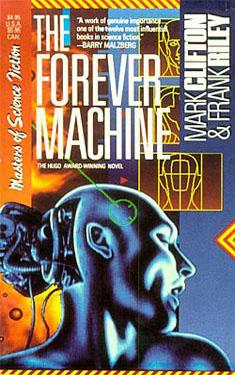RYO Review: The Forever Machine by Mark Clifton and Frank Riley

 There might be a story somewhere underneath all this twaddle, but Clifton and Riley chose to tell the wrong one.
There might be a story somewhere underneath all this twaddle, but Clifton and Riley chose to tell the wrong one.
You would think the combined effort of two authors would enhance the narrative, correct the mistakes, and plug the plot holes. Two perspectives, two brains, two sets of eyeballs… it should amount to a more perfect work, but instead, like all classroom group work, the product fizzles with a fragmented story, cut-and-paste wisdom, and retroactive elaboration. And one writer probably did most of the work, while the other guy flirted with some girls at another table.
Well, that’s been my experience with group work.
The Story: Professors Billings and Hoskins are on the run after creating Bossy, a controversial supercomputer with powerful, yet untested potential. The professors depend on telepathic student, Joe Carter, to help them evade the government until they can test out Bossy on a human being. But Joe may have other interests in Bossy that he isn’t revealing.
It starts a few chapters too early. It’s driven by the wrong character. The science is screwy and unresearched, (I’m assuming, because it doesn’t make any sense, and the authors don’t bother to explain it). The plot holes are gargantuan. The flow is obstructed with clunky dialogue tags, and chunks of elaborative text, voiced differently, as if one author wrote the story, then the other went back to add paragraphs of detail, in order to meet the length of a novel.

 But, strangely, it’s still a page-turner. It was not a struggle for me to finish the book, but only because I foolishly anticipated interesting plot developments that never materialized.
But, strangely, it’s still a page-turner. It was not a struggle for me to finish the book, but only because I foolishly anticipated interesting plot developments that never materialized.
*Spoiler Alert*
*Not that it matters*
It turns out that Bossy (stupid name for a computer, and it’s not even an acronym) can grant eternal youth and immortality by way of cyber-psychosomatic therapy, designed by applying Einstein’s theories to psychology (huh?). The subject plugs in, goes into a coma for a couple of weeks, and Bossy searches their brain for maladjustments and disorders, corrects them, and feeds the subject “plasma” through an I.V. Then, the subject wakes up as a completely new person with a hot, 21-year-old bod and telepathic powers. But it only works on people who have flexible worldviews (i.e. criminals, uneducated), and not scholarly folks with rigid biases.
The first major problem: Bossy’s test subject is Mabel, an aged prostitute who provides cover for money-launderers. She’s kind and tolerant, easily impressed, and supposedly messed up. BUT WE NEVER GET TO KNOW HER. She gets fixed by Bossy, then runs around naked. The entire story should have been from her point-of-view, but we get cardboard Joe instead…
The second major problem: Not only can Joe read minds, but he can telepathically control the behaviors of others, even from a short distance. But the writers forget that at times, and conflicts happen that could have been managed by Joe’s telepathic control, which rendered many scenes unnecessary.
The third major problem: If aging is caused by the daily wear-and-tear of mental health, as the premise suggests, why do animals age? Sure, my mom’s dog is neurotic, and we have these asshole birds called grackles, who clearly have insecurity issues, but the prairie dogs in my area seem totally chilled, and they have short life spans.
The fourth major problem: The premise is intriguing, but the writers do not foster that intrigue. They neglect the contextual and emotional shifts that the story presents, while they stick to the dry outline of their original plan. Even the dubious science could be forgiven if the story had more dramatic meat.
It’s lazy. It’s clumsy. Don’t bother. If you want a vintage Hugo winner, read this one.
And if that’s not enough to convince you, you can read this article, which addresses the controversy surrounding this book’s Hugo win.



















 Full Details
Full Details


No comments yet.
Sorry, the comment form is closed at this time.